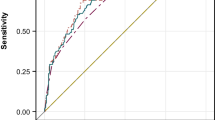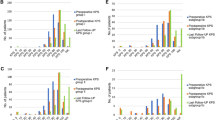Abstract
Background
Meningiomas are more prevalent in elderly individuals; however, the surgical outcome and prognostic factors in this age group are unclear. This retrospective study aimed to identify the prognostic factors of elderly patients with intracranial meningiomas who underwent surgical resection.
Methods
Eighty-six patients (aged ≥65) diagnosed with an intracranial meningioma were surgically treated at our department. The clinical, radiological, and follow-up data were retrospectively reviewed. Univariate and multivariate logistic analyses were performed to identify relationships between factors [age, sex, neurological condition, concomitant disease, American Society of Anesthesiology (ASA) classification, preoperative Karnofsky Performance Scale (KPS) score, tumor location and size, peritumoral edema, and Simpson resection grade] and outcome.
Results
One patient (1.2 %) died within 30 days of surgery. The morbidity rate was 37.2 %. Postoperative morbidities occurred more frequently in the patients with preoperative neurological deficits than in those without (p = 0.049). Univariate analysis identified significant relationships between a low KPS score (≤70) at discharge and preoperative neurological deficits, low preoperative KPS score (≤70), and critical tumor location (p < 0.001, p < 0.001, and p = 0.04, respectively). In the multivariate logistic analysis, only the preoperative KPS score remained significant for the KPS score at discharge (p = 0.005); there was no significant association with the most recent KPS score.
Conclusion
The outcome of intracranial meningioma resection in elderly individuals is favorable if the preoperative KPS score is >70 and no neurological deficits are present. Treatment decisions should be patient-specific, and additional factors should be considered when operations are performed in patients with a low preoperative KPS score or neurological deficits.

Similar content being viewed by others
References
Arienta C, Caroli M, Crotti F, Villani R (1990) Treatment of intracranial meningiomas in patients over 70 years old. Acta Neurochir 107:47–55
Awad IA, Kalfas I, Hahn JF, Little JR (1989) Intracranial meningiomas in the aged: surgical outcome in the era of computed tomography. Neurosurgery 24:557–560
Bateman BT, Pile-Spellman J, Gutin PH, Berman MF (2005) Meningioma resection in the elderly: nationwide inpatient sample, 1998–2002. Neurosurgery 57:866–872, discussion 866–872
Black P, Kathiresan S, Chung W (1998) Meningioma surgery in the elderly: a case–control study assessing morbidity and mortality. Acta Neurochir 140:1013–1016, discussion 1016–1017
Boviatsis EJ, Bouras TI, Kouyialis AT, Themistocleous MS, Sakas DE (2007) Impact of age on complications and outcome in meningioma surgery. Surg Neurol 68:407–411, discussion 411
Buhl R, Hasan A, Behnke A, Mehdorn HM (2000) Results in the operative treatment of elderly patients with intracranial meningioma. Neurosurg Rev 23:25–29
Caroli M, Locatelli M, Prada F, Beretta F, Martinelli-Boneschi F, Campanella R, Arienta C (2005) Surgery for intracranial meningiomas in the elderly: a clinical-radiological grading system as a predictor of outcome. J Neurosurg 102:290–294
Claus EB, Bondy ML, Schildkraut JM, Wiemels JL, Wrensch M, Black PM (2005) Epidemiology of intracranial meningioma. Neurosurgery 57:1088–1095, discussion 1088–1095
Cohen-Inbar O, Soustiel JF, Zaaroor M (2010) Meningiomas in the elderly, the surgical benefit and a new scoring system. Acta Neurochir 152:87–97, discussion 97
Cohen-Inbar O, Sviri GE, Soustiel JF, Zaaroor M (2011) The Geriatric Scoring System (GSS) in meningioma patients—validation. Acta Neurochir 153:1501–1508, discussion 1508
Cornu P, Chatellier G, Dagreou F, Clemenceau S, Foncin JF, Rivierez M, Philippon J (1990) Intracranial meningiomas in elderly patients. Postoperative morbidity and mortality. Factors predictive of outcome. Acta Neurochir 102:98–102
D’Andrea G, Roperto R, Caroli E, Crispo F, Ferrante L (2005) Thirty-seven cases of intracranial meningiomas in the ninth decade of life: our experience and review of the literature. Neurosurgery 56:956–961, discussion 956–961
Djindjian M, Caron JP, Athayde AA, Fevrier MJ (1988) Intracranial meningiomas in the elderly (over 70 years old). A retrospective study of 30 surgical cases. Acta Neurochir 90:121–123
Gerlach R, Raabe A, Scharrer I, Meixensberger J, Seifert V (2004) Post-operative hematoma after surgery for intracranial meningiomas: causes, avoidable risk factors and clinical outcome. Neurol Res 26:61–66
Grossman R, Mukherjee D, Chang DC, Bennett R, Brem H, Olivi A, Quinones-Hinojosa A (2011) Preoperative charlson comorbidity score predicts postoperative outcomes among older intracranial meningioma patients. World Neurosurg 75:279–285
Konglund A, Rogne SG, Helseth E, Meling TR (2013) Meningioma surgery in the very old—validating prognostic scoring systems. Acta Neurochir 155:2263–2271, discussion 2271
Konglund A, Rogne SG, Lund-Johansen M, Scheie D, Helseth E, Meling TR (2013) Outcome following surgery for intracranial meningiomas in the aging. Acta Neurol Scand 127:161–169
Kuratsu J, Ushio Y (1997) Epidemiological study of primary intracranial tumours in elderly people. J Neurol Neurosur Psychiatr 63:116–118
Lee CH, Jung KW, Yoo H, Park S, Lee SH (2010) Epidemiology of primary brain and central nervous system tumors in Korea. J Korean Neurosurg Soc 48:145–152
Lieu AS, Howng SL (1998) Surgical treatment of intracranial meningiomas in geriatric patients. Kaohsiung J Med Sci 14:498–503
Louis DN, Scheithauer BW, Budka H, von Deimling A, Kepes JJ (2000) Meningiomas. In: Kleihues P, Cavenee WK (eds) Pathology and genetics of tumours of the nervous system: World Health Organisation classification of tumours. IARC Press, Lyon, pp 176–184
Louis DN, Ohgaki H, Wiestler OD, Cavenee WK, Burger PC, Jouvet A, Scheithauer BW, Kleihues P (2007) The 2007 WHO classification of tumours of the central nervous system. Acta Neuropathol 114:97–109
Mastronardi L, Ferrante L, Qasho R, Ferrari V, Tatarelli R, Fortuna A (1995) Intracranial meningiomas in the 9th decade of life: a retrospective study of 17 surgical cases. Neurosurgery 36:270–274
Nakamura M, Roser F, Michel J, Jacobs C, Samii M (2003) The natural history of incidental meningiomas. Neurosurgery 53:62–70, discussion 70–61
Nakamura M, Roser F, Dormiani M, Vorkapic P, Samii M (2005) Surgical treatment of cerebellopontine angle meningiomas in elderly patients. Acta Neurochir 147:603–609, discussion 609–610
Niiro M, Yatsushiro K, Nakamura K, Kawahara Y, Kuratsu J (2000) Natural history of elderly patients with asymptomatic meningiomas. J Neurol Neurosur Psychiatr 68:25–28
Nishizaki T, Kamiryo T, Fujisawa H, Ohshita N, Ishihara H, Ito H, Aoki H (1994) Prognostic implications of meningiomas in the elderly (over 70 years old) in the era of magnetic resonance imaging. Acta Neurochir 126:59–62
Papo I (1983) Intracranial meningiomas in the elderly in the CT scan era. Acta Neurochir 67:195–204
Patil CG, Veeravagu A, Lad SP, Boakye M (2010) Craniotomy for resection of meningioma in the elderly: a multicentre, prospective analysis from the national surgical quality improvement program. J Neurol Neurosur Psyciatr 81:502–505
Poon MT, Fung LH, Pu JK, Leung GK (2013) Outcome comparison between younger and older patients undergoing intracranial meningioma resections. J Neuro-Oncol 114:219–227
Poon MT, Fung LH, Pu JK, Leung GK (2014) Outcome of elderly patients undergoing intracranial meningioma resection—a systematic review and meta-analysis. Br J Neurosurg 28:303–309
Proust F, Verdure L, Toussaint P, Bellow F, Callonec F, Menard JF, Freger P (1997) Intracranial meningioma in the elderly. Postoperative mortality, morbidity and quality of life in a series of 39 patients over 70 years of age. Neurochirurgie 43:15–20
Sacko O, Sesay M, Roux FE, Riem T, Grenier B, Liguoro D, Loiseau H (2007) Intracranial meningioma surgery in the ninth decade of life. Neurosurgery 61:950–954, discussion 955
Schul DB, Wolf S, Krammer MJ, Landscheidt JF, Tomasino A, Lumenta CB (2012) Meningioma surgery in the elderly: outcome and validation of 2 proposed grading score systems. Neurosurgery 70:555–565
Simpson D (1957) The recurrence of intracranial meningiomas after surgical treatment. J Neurol Neurosur Psychiatr 20:22–39
Umansky F, Ashkenazi E, Gertel M, Shalit MN (1992) Surgical outcome in an elderly population with intracranial meningioma. J Neurol Neurosur Psychiatr 55:481–485
Wiemels J, Wrensch M, Claus EB (2010) Epidemiology and etiology of meningioma. J Neuro-Oncol 99:307–314
Acknowledgments
We would like to thank the neurosurgeons and staff of The First Affiliated Hospital of Guangxi Medical University for their excellent work. We thank Medjaden Bioscience, Ltd., for assisting in the preparation of this manuscript.
Patient consent
The patients or their relatives consented to study participation and the use of their data for research purposes.
Conflicts of interest
None
Author information
Authors and Affiliations
Corresponding author
Additional information
Comments
Our Chinese colleaques retrospectively analyzed prognostic factors for the outcome in 86 elderly (≥65 years) patients after a microsurgical removal of an intracranial meningioma. But their task was impossible—only one variable in the cohort was rather constant, i.e., modern microneurosurgery in advanced services, but two were highly variable, i.e., intracranial meningiomas (size/site/adherence to adjacent structures) and elderly patients (neurological deficits/concomitant diseases and medications/previous neurocardiovascular events)—at least in unselected population-based services.
Let's try an Individual Risk Calculator of Operative 12-month Mortality and Morbidity of Intracranial Meningiomas in the Elderly based on the authors’ multivariate analysis data. What would the risk of operative 1- or 12-month mortality be for this 70-year-old female, a retired cardiologist, with treated hypertension and anticoagulation because of atrial fibrillation, now presenting with a suprasellar meningioma and rapidly reduced visual acuity not allowing an independent life any more? This is not possible because there are only seven tuberculum sellae meningiomas in their series, etc. The individual risk calculator would require 8600 rather than 86 patients. The authors conclude that ‘prospective and large sample studies must be performed to identify prognostic factors and surgical selection criteria for elderly patients with intracranial meningioma.’ I don't think so because that effort would exceed our combined capacity. But I totally agree that ‘treatment decisions should be patient-specific.’
Who then is elderly? My official retirement age is 68 years. If I then had a 5-cm falcine meningioma with focal seizures in the left foot, what would my neurosurgeon, orginally trained by me, tell me, and in what tone, about my possible outcome and complications?—Professor, considering your age, I am sorry to tell that your left foot will most probably remain weaker than it is now and the risk of venous infarctions from occlusion of bridging veins…
Juha E Jääskeläinen
Kuopio Finland
Electronic supplementary material
Below is the link to the electronic supplementary material.
ESM 1
(DOC 228 kb)
Rights and permissions
About this article
Cite this article
Chen, ZY., Zheng, CH., Tang Li et al. Intracranial meningioma surgery in the elderly (over 65 years): prognostic factors and outcome. Acta Neurochir 157, 1549–1557 (2015). https://doi.org/10.1007/s00701-015-2502-9
Received:
Accepted:
Published:
Issue Date:
DOI: https://doi.org/10.1007/s00701-015-2502-9




